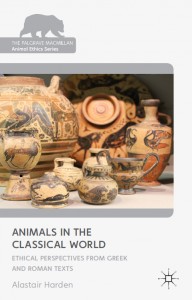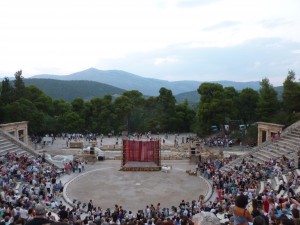Our Doctoral Researcher Lee Graña obtained a departmental travel award from the Wardman Travel Award fund, enabling him to attend a colloquium in Madrid. Here is his report:
The international colloquium ‘Recursos del mar y productos transformados en la antigüedad’ took place over two days in February at the Casa de Velázquez institute in Madrid, Spain. Attending were French, Spanish and Portuguese professors, archaeologists and chemists, as well as Tonnes Bekker Nielsen from Denmark and Wim Van Neer from Belgium.
The subject was the Roman fishing industry via the study of the archaeological remains of fish-processing sites. The aims were to evaluate the current trends in the study of the ichthyofaunal remains of recent archaeological sites across the Mediterranean and Atlantic coast.
The event was open to the public and free of charge. However, due to the nature of the subject and the concentration on the current attitudes of professional research, only a hand full of students attended. This proved beneficial as it allowed more concrete discussions among the leading experts.
3rd of Feb (day one)
An introduction was given by Arturo Morales Muniz who discussed the history of this field of study and highlighted the issues of previous scholars and their legacy on modern interpretations.

Poster advertising entrance to the colloquium. Pictures could not be taken within the lecture theatre.
The talks that followed in the morning were given in French and Spanish and discussed our current understanding and interpretations of the available evidence: economic traits of production sites (Enrique Garcia Vargas); growing appreciation for Black Sea industry (Tonnes Bekker Nielsen); tituli picti from amphorae remains (Kevin Quillon); and alternative resources for Baetican production (Dario Bernal Casasola).
I was fortunate that, due to the low attendance of students, I was invited to have lunch with the professors, giving me an opportunity to hear their thoughts on the subject in a more informal setting, as well as discuss my current work with the University of Reading.
The second session saw a concentration on the ichthyofaunal remains from current excavations, with a focus on the Atlantic coast: Brice Ephrem on France; Wim Van Neer on production sites further inland; and Carlos Fabiao, the leading expert in Portugal, and Sonia Gabriel, discussed their approach to the excavation of one of the largest known production sites of the Roman Empire at Troia and current excavations at the Tajo estuary. This included the environmental sampling of ichthyofaunal remains, often missing in Mediterranean digs. Finally, Eufrasia Rosello Izquierdo and Arturo Morales Muñiz, discussed an overview of such ichthyofaunal remains in the Iberian Peninsula.
The end of the first day saw a debate spark off among the leading experts on the Latin terminology used in describing the fish-sauce manufactured by the Romans. Sally Grainger, an experimental archaeologist and graduate of the University of Reading, defended her views and experiments as a chef and was allowed to give a talk the following day.
4th of Feb (day two)
The second day was much shorter. Prior to a coffee break the lectures given were conducted by chemists and environmental archaeologists: Sonia Gabriel, Ines Vaz Pinto, Nicolas Garnier and Myriam Sternberg. This provided us with the techniques and results of conducting up to date chemical analyses of ichthyofaunal and mineral remains. The conclusions suggested a more complex industry than previously believed, with the possible dyeing, or flavour enhancing of fish sauces. The reasons suggested by Dario Bernal and Sally Grainger were the possible imitation of more expensive versions of fish sauce.
Sally Grainger then gave us a talk on her experimental research on fish sauce and how her results, in line with the classical record, suggested the names given to fish-sauces were related to their production, stating: “The Greek transliteration by the Romans, rather than translation, along with modern misinterpretations by scholars restricted to a few sources, have confused our understanding of fish sauces”.
The final talk was given by a chemist, Victor Palacios Macias who, along with Dario Bernal Casasola, have also experimented on the reproduction of Roman fish-sauce, as chemically identical as possible to environmental samples recovered at Baelo Claudia in Southern Spain. The results were positive and the sauce a gastronomic success. To our benefit, some samples had been brought to Madrid for us to try. Delicious!
Figure 3: Victor Palacios Macias (right) talks to the Spanish radio TVE about the product.
The fish sauce produced by Palacios Macias is a prototype for a product that will hopefully reach the market in a short time. Along with an Italian fish sauce (Colatura) they are the only commercial fish sauces produced in Europe which claim to continue a near three thousand year old tradition of fish sauce production. Regardless the commercial value, the product has also highlighted several aspects previously ignored, though argued by a few scholars (such as Sally Grainger): that the Roman fish sauce is far from “a poisonous fish that burns the stomach” as suggested by the well-known stoic, Seneca (Ep. xcv.xxv), defending the principles of his time. Instead it is a nutritional and delicious product that would have been enjoyed by many. Certainly the result of a successful industry that requires further study.
My experiences at the conference, the contacts made and the novel approaches highlighted to me by some of the leading experts in the field have made this trip an important starting point for my PhD research and for future work in this field. This would not have been possible without the support of my supervisor and the University of Reading.
Lee Graña





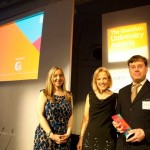
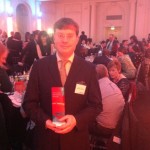
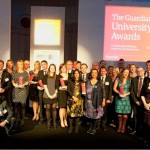




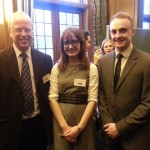
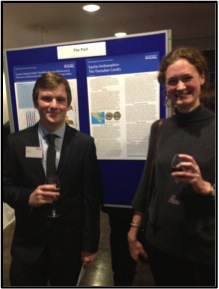
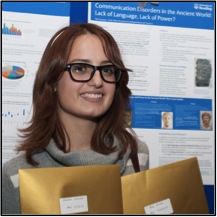
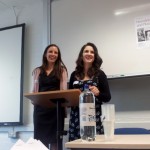








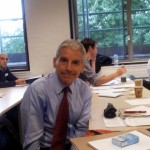

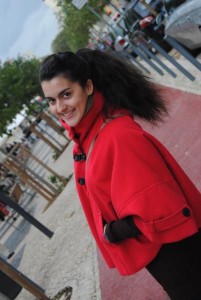 My name is Mariana Gomes Beirão, I’m Portuguese, 21, and I am currently doing a 3 month Erasmus internship in the
My name is Mariana Gomes Beirão, I’m Portuguese, 21, and I am currently doing a 3 month Erasmus internship in the 